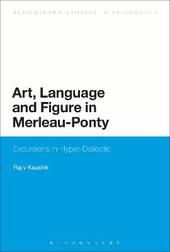
|
Art, Language and Figure in Merleau-Ponty: Excursions in Hyper-Dialectic
Hardback
Main Details
| Title |
Art, Language and Figure in Merleau-Ponty: Excursions in Hyper-Dialectic
|
| Authors and Contributors |
By (author) Professor Rajiv Kaushik
|
| Series | Bloomsbury Studies in Philosophy |
|---|
| Physical Properties |
| Format:Hardback | | Pages:168 | | Dimensions(mm): Height 234,Width 156 |
|
| Category/Genre | Phenomenology and Existentialism
Philosophy - aesthetics |
|---|
| ISBN/Barcode |
9781441136268
|
| Classifications | Dewey:142.7 |
|---|
| Audience | | General | | Tertiary Education (US: College) | | Professional & Vocational | |
|---|
|
Publishing Details |
| Publisher |
Bloomsbury Publishing Plc
|
| Imprint |
Bloomsbury Academic USA
|
| Publication Date |
12 September 2013 |
| Publication Country |
United States
|
Description
Art, Language and Figure in Merleau-Ponty: Excursions in Hyper-Dialectic considers Merleau-Ponty's later ontology of language in the light of his "figured philosophy," which places the work of art at the centre of its investigation. Kaushik argues that, since for Merleau-Ponty the work of art actualizes a sensible ontology that would otherwise be invisible to the history of dialectics, it undermines the fundamental difference between being and linguistic structures. Art, Language and Figure in Merleau-Ponty takes up the radical task of the figured philosophy to render sensible and linguistic spaces prior to the thought of their separation. Kaushik situates Merleau-Ponty's criticisms of Saussure's linguistic system, as well as a more general repudiation of the act of inscribing in favour of an abstracted textual meaning, in this context. Following the artists most important to Merleau-Ponty's own writings on art, such as Paul Klee and his fascination with hieroglyphics, and extending these analyses to more recent 21st Century artists such as Cy Twombly, Kaushik takes an excursion into the places where art and language, image and text, drawing and writing, figure and discourse, are interlaced in Merleau-Ponty's last ontology. In view of these intersections, Kaushik ultimately argues, the work of art gives us the spaces where the possibilities of philosophy, both past and future, reside. As the first sustained treatment into the relationship between art and language, this is an important contribution to Meleau-Ponty's philosophy and scholars of aesthetics.
Author Biography
Rajiv Kaushik is Associate Professor of Philosophy at Brock University, Canada.
ReviewsIn the conclusion of his Inaugural Address at the College de France Merleau-Ponty, reflecting on the present state of philosophy, says that "philosophy limps and that this limping is a virtue." He meant that philosophy has irrevocably lost its foundational stature--its role as the "mirror of Nature." In the future it would draw its sustenance by frequenting the arts. In Art, Language and Figure in Merleau-Ponty: Excursions in Hyper-Dialectic, Rajiv Kaushik shows us in detail how Merleau-Ponty in his reflection on painting in his late work moves in this direction. In addition Kaushik gives us a direction in which philosophy in the future might continue this hyper-reflective thinking. -- Bernard Flynn, Adjunct Professor of Philosophy, New School For Social Research, USA This rich, important, and meticulously researched and argued book makes a distinctive and profound contribution to the recent studies that have addressed Merleau-Ponty's late philosophy, and it promises to have lasting significance. -- Veronique Foti, Professor of Philosophy, Pennsylvania State University, USA
|